Therapy from Quran and Sunnah 3 - Transforming Destructive Behaviors
Therapy from Quran and Sunnah 3 - Transforming Destructive Behaviors
Publisher:
IIPH (International Islamic Publishing House)
Author:
Dr. Feryad A. Hussain
Language:
English
Binding:
Hard Cover
Pages: 384
Size: 22cm x 15cm
Couldn't load pickup availability
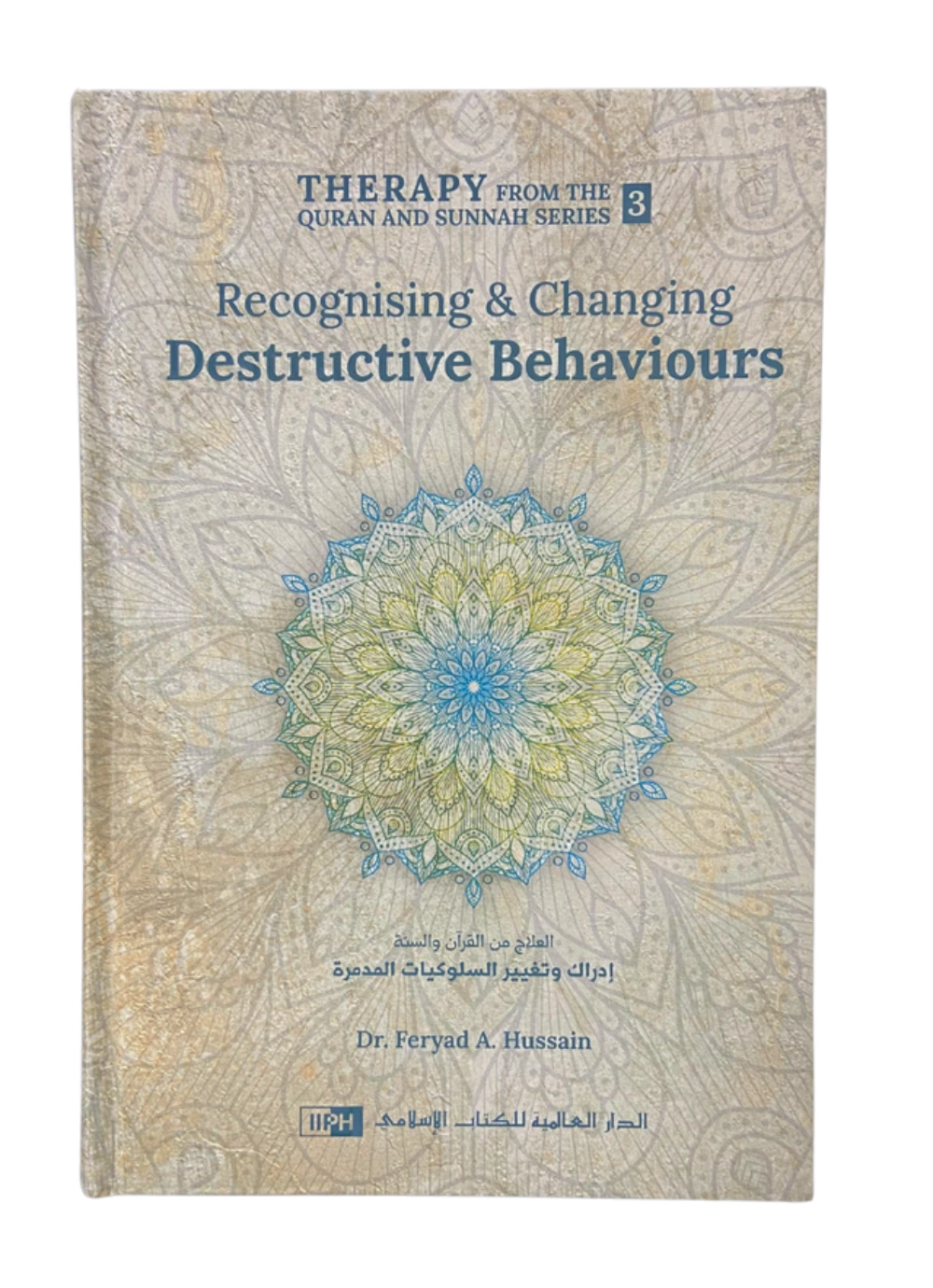
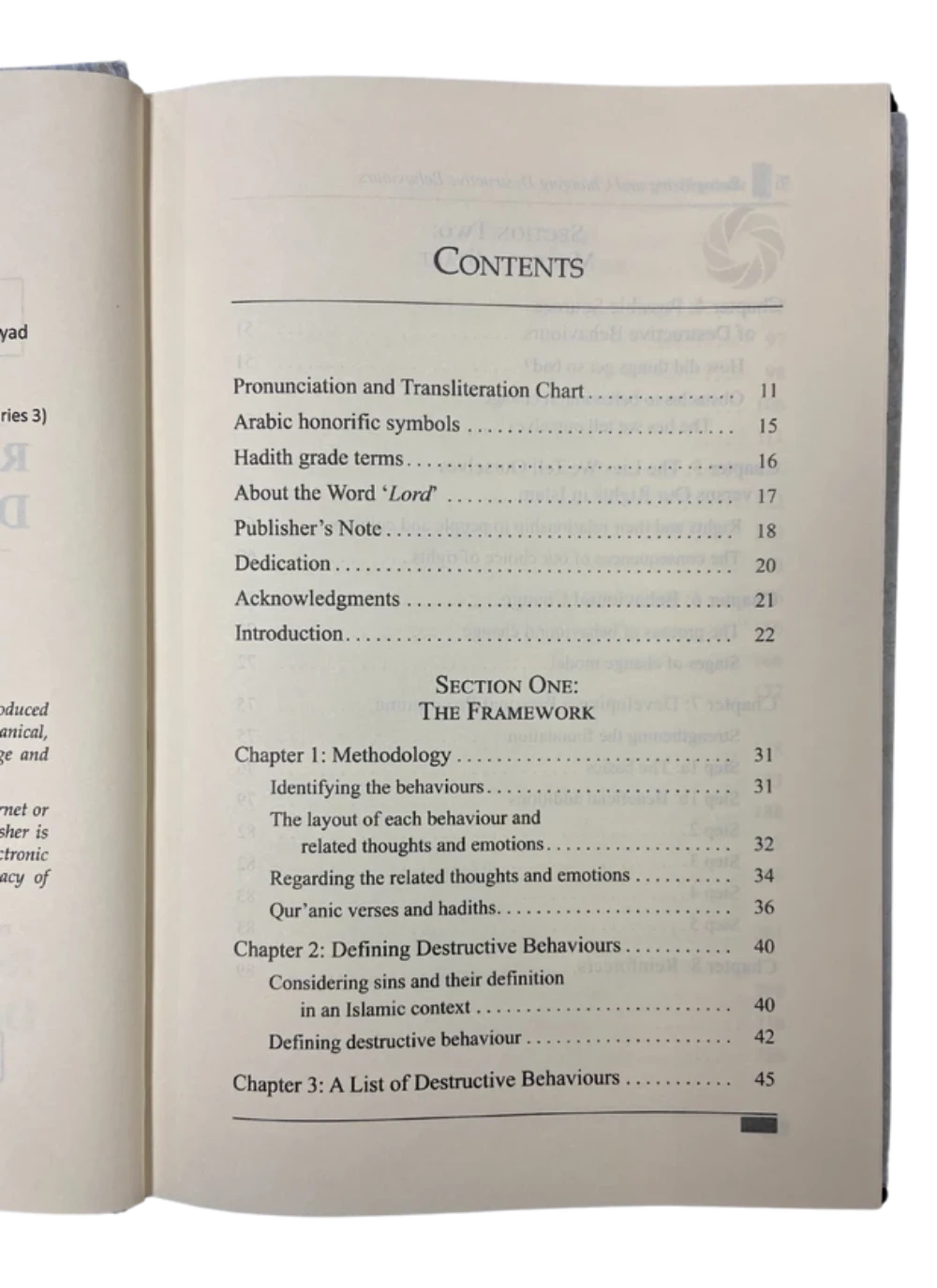
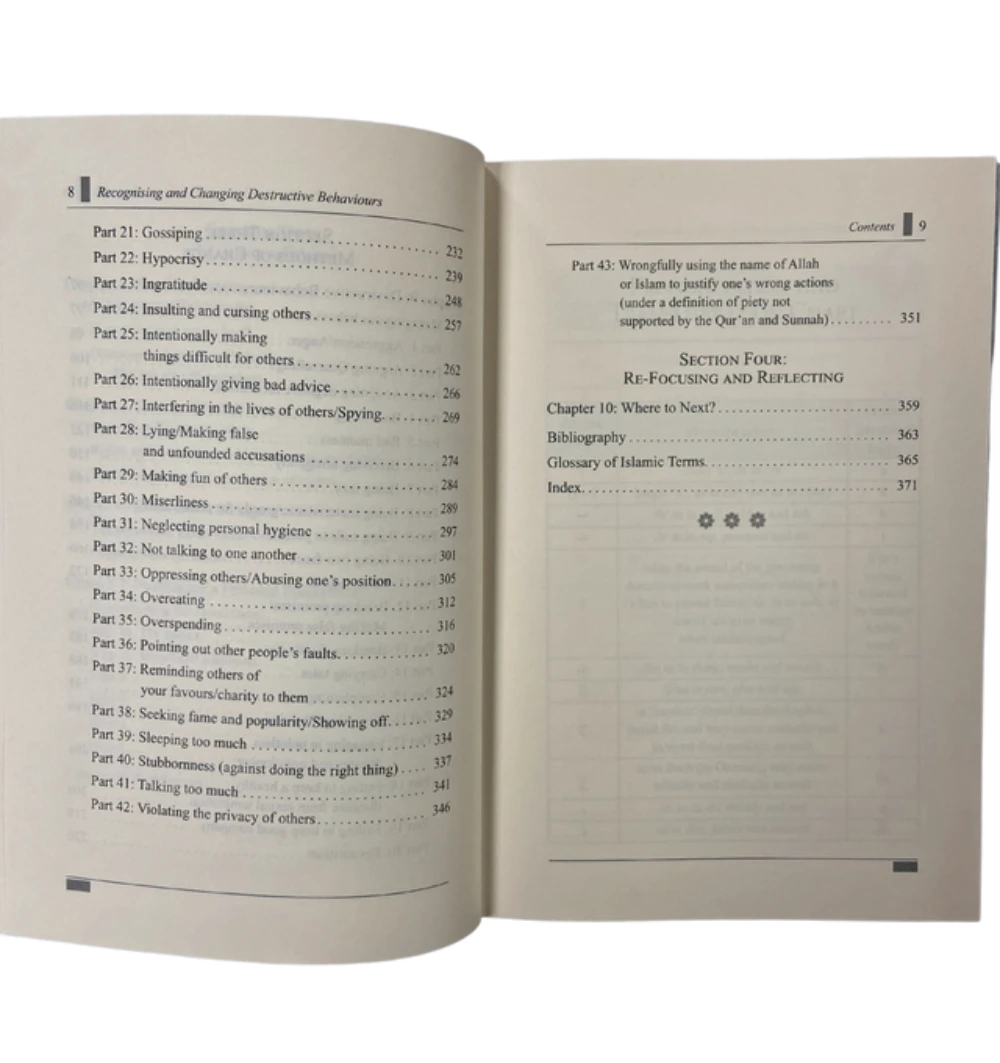
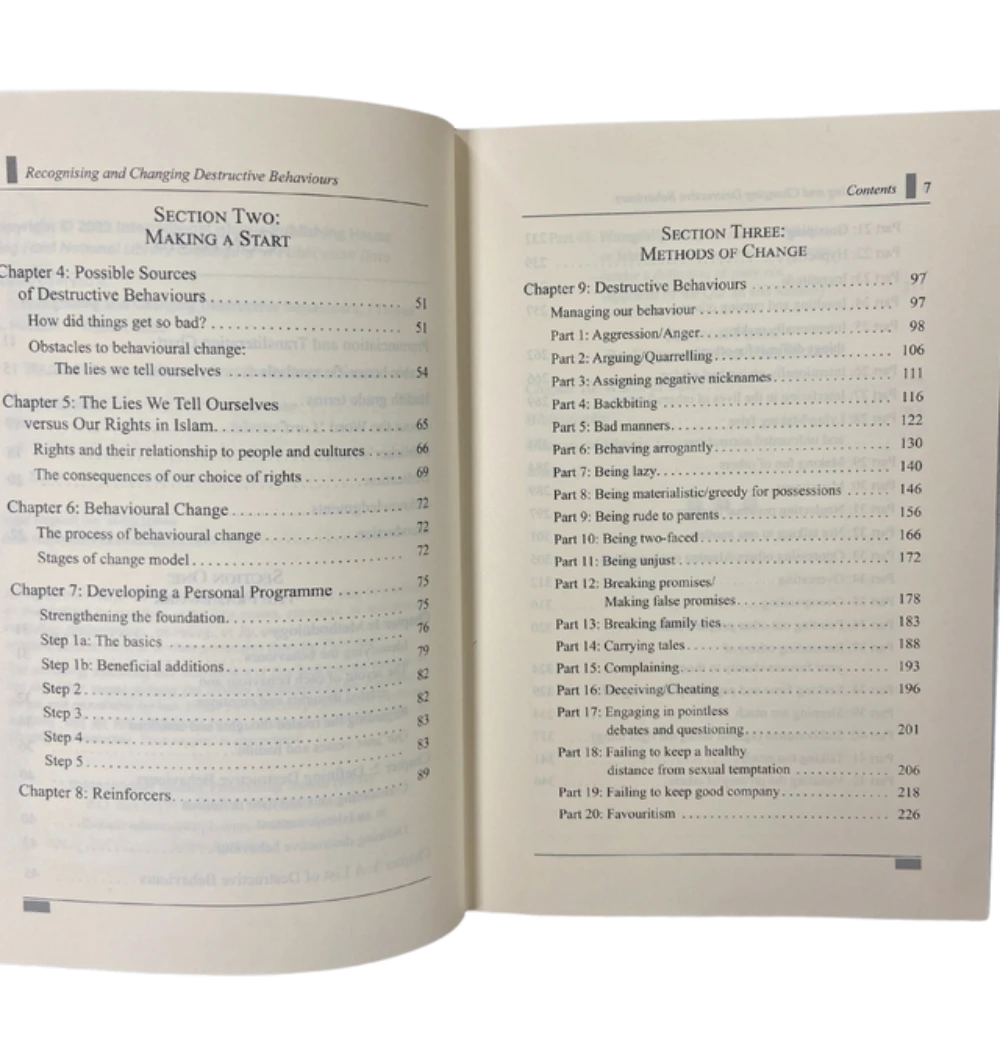
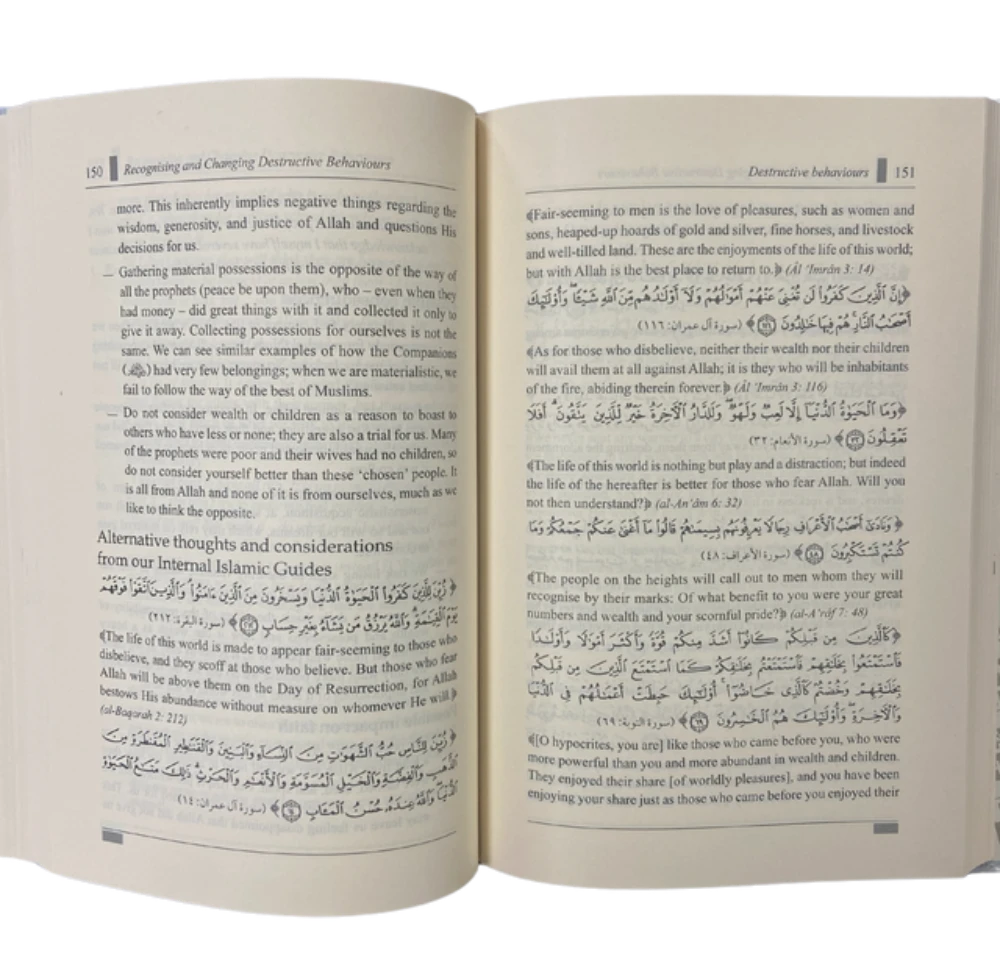
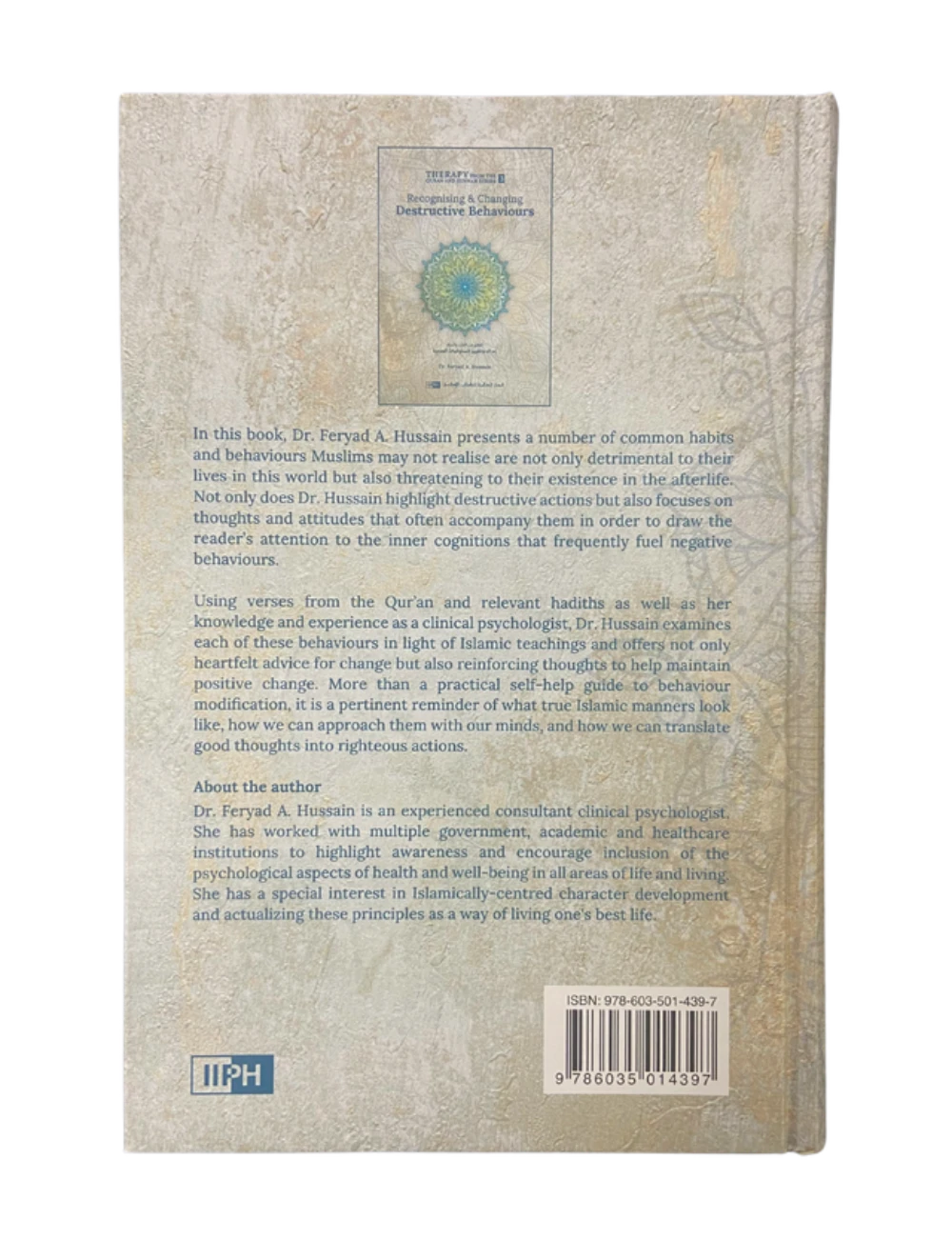
Collapsible content
Description of Book
Therapy from Quran and Sunnah 3 - Transforming Destructive Behaviors
Recognizing and Transforming Destructive Behaviors blends insights from the Qur’an, selected hadiths, and modern psychological principles to highlight harmful behaviors and guide readers toward positive change through mindful reflection. Dr. Feryad A. Hussain sets the ideal of Islamic conduct as the ultimate goal, offering practical, actionable advice to help readers align their thoughts and actions with Islamic teachings. By fostering self-awareness and spiritual growth, the book encourages a balanced approach to life, focused on both worldly success and eternal well-being.
Publisher
IIPH (International Islamic Publishing House)
Author
- Dr. Feryad A. Hussain
Sample Pages - Content
Page:01
THERAPY FROM THE
QURAN AND SUNNAH SERIES
3
Recognising & Changing Destructive Behaviours
العلاج من القرآن والسنة إدراك وتغيير السلوكيات المدمرة
Dr. Feryad A. Hussain
الدار العالمية للكتاب الإسلامي TIPH
Page:02
8
Recognising and Changing Destructive Behaviours
Contents
9
Part 21: Gossiping.
232
Part 22: Hypocrisy.
Part 43: Wrongfully using the name of Allah
239
Part 23: Ingratitude
248
Part 24: Insulting and cursing others.
257
or Islam to justify one's wrong actions (under a definition of piety not supported by the Qur'an and Sunnah).
351
Part 25: Intentionally making
things difficult for others.
SECTION FOUR:
262
RE-FOCUSING AND REFLECTING
Part 26: Intentionally giving bad advice.
266
Part 27: Interfering in the lives of others/Spying.
Chapter 10: Where to Next?.
359
269
Part 28: Lying/Making false
363
Bibliography...
and unfounded accusations
274
Glossary of Islamic Terms.
365
Part 29: Making fun of others
371
284
Index.
Part 30: Miserliness....
289
Part 31: Neglecting personal hygiene
297
Part 32: Not talking to one another
301
Part 33: Oppressing others/Abusing one's position.
305
Part 34: Overeating
312
Part 35: Overspending...
316
Part 36: Pointing out other people's faults.
320
Part 37: Reminding others of
your favours/charity to them
Part 38: Seeking fame and popularity/Showing off...
Part 39: Sleeping too much
Part 41: Talking too much
Part 40: Stubbornness (against doing the right thing).
Part 42: Violating the privacy of others.
223553
324
329
334
337
341
346
Page:03
Recognising and Changing Destructive Behaviours
SECTION TWO: MAKING A START
w what Contents
SECTION THREE:
METHODS OF CHANGE
Chapter 4: Possible Sources
of Destructive Behaviours.
How did things get so bad?.
Chapter 9: Destructive Behaviours
97
31
Tes Managing our behaviour
97
51
Obstacles to behavioural change: The lies we tell ourselves
Part 1: Aggression/Anger..
98
Part 2: Arguing/Quarrelling.
106
54
Part 3: Assigning negative nicknames.
111
Chapter 5: The Lies We Tell Ourselves
Part 4: Backbiting..
116
versus Our Rights in Islam...
Rights and their relationship to people and cultures.
65
Part 5: Bad manners...
122
The consequences of our choice of rights
88
66
Part 6: Behaving arrogantly.
130
69
Part 7: Being lazy..
140
Chapter 6: Behavioural Change.
72
Part 8: Being materialistic/greedy for possessions
146
The process of behavioural change.
72
Part 9: Being rude to parents.
156
Part 10: Being two-faced.
166
Stages of change model...
72
Part 11: Being unjust..
172
Chapter 7: Developing a Personal Programme
75
75
Strengthening the foundation..
CL Part 12: Breaking promises/
Making false promises.
178
Step la: The basics
Step 1b: Beneficial additions..
Step 2.
Step 3.
Step 4.
Step 5.
89
2 283 2
Part 13: Breaking family ties..
183
Part 14: Carrying tales....
188
Part 15: Complaining...
Part 16: Deceiving/Cheating...
193
196
Part 17: Engaging in pointless debates and questioning.
201
Chapter 8: Reinforcers.
Part 18: Failing to keep a healthy
distance from sexual temptation
206
Part 19: Failing to keep good company. Part 20: Favouritism
218
226
7
Page:04
150 Recognising and Changing Destructive Behaviours
more. This inherently implies negative things regarding the wisdom, generosity, and justice of Allah and questions His decisions for us.
-Gathering material possessions is the opposite of the way of all the prophets (peace be upon them), who - even when they had money - did great things with it and collected it only to give it away. Collecting possessions for ourselves is not the same. We can see similar examples of how the Companions () had very few belongings; when we are materialistic, we fail to follow the way of the best of Muslims.
Do not consider wealth or children as a reason to boast to others who have less or none; they are also a trial for us. Many of the prophets were poor and their wives had no children, so do not consider yourself better than these 'chosen' people. It is all from Allah and none of it is from ourselves, much as we like to think the opposite.
Alternative thoughts and considerations from our Internal Islamic Guides
Destructive behaviours 151
Fair-seeming to men is the love of pleasures, such as women and sons, heaped-up hoards of gold and silver, fine horses, and livestock and well-tilled land. These are the enjoyments of the life of this world; but with Allah is the best place to return to. (Al Irán 3: 14)
وإن الَّذِينَ كَفَرُوا لَن تُغْنِي عَنْهُمْ أَمْوَالُهُمْ وَلَا أَوْلَدُهُم مِّنَ اللَّهِ شَيْئًا وَأَوْلَيكَ أَصْحَبُ النَّارِ هُمْ فِيهَا خَلِدُونَ ) (سورة آل عمران: ١١٦)
As for those who disbelieve, neither their wealth nor their children will avail them at all against Allah; it is they who will be inhabitants of the fire, abiding therein forever. (Al Imran 3: 116)
وَمَا الْحَيَوةُ الدُّنْيَا إِلَّا لَعِبٌ وَلَهْوٌ وَلَلنَّارُ الْآخِرَةُ خَيْرٌ لِلَّذِينَ يَتَّقُونَ أَفَلَا تَعْقِلُونَ ) (سورة الأنعام: ٣٢)
The life of this world is nothing but play and a distraction; but indeed the life of the hereafter is better for those who fear Allah. Will you not then understand? (al-An'am 6:32)
The people on the heights will call out to men whom they will recognise by their marks: Of what benefit to you were your great numbers and wealth and your scornful pride? (al-A'raf 7: 48)
وَنَادَى أَحبُ الْأَعْرَافِ بجا لا يعرِفُونَهُم بِسَهُمْ قَالُوا مَا أَغْنَى عَنكُمْ جَمْعُكُمْ وَمَا كُنتُمْ تَسْتَكْبِرُونَ ) (سورة الأعراف: ٤٨)
وكَالَّذِينَ مِن قَبلِكُمْ كَانُوا أَشَدَّ مِنكُمْ قُوَّةً وَأَكْثَرَ أَمْوَلَا وَأَوْلَدًا فَاسْتَمْتَعُوا بِعَلَيْهِمْ فَاسْتَمْتَعْتُم بِعَلَيْكُرُ كَمَا اسْتَمْتَعَ الَّذِينَ مِن قَبْلِكُم يخلَفِهِمْ وَخُضْتُم كَالَّذِى خاضوا أولتيك حَبِطَتْ أَعْلُهُم في
وَالْآخِرَةِ وَأُولَيكَ هُمُ الخَيرُونَ ) (سورة التوبة: ١٩)
الله
وزينَ لِلَّذِينَ كَفَرُوا الْحَيَوةُ الدُّنْيَا وَيَسْخَرُونَ مِنَ الَّذِينَ ءَامَنُوا وَالَّذِينَ اتَّقَوْا فَوقَهُمْ يوْمَ القِيمَةِ وَاللهُ يَرْزُقُ مَن يَشَاءُ بِغَيْرِ حِسَابٍ ) (سورة البقرة: ٢١٢)
The life of this world is made to appear fair-seeming to those who disbelieve, and they scoff at those who believe. But those who fear Allah will be above them on the Day of Resurrection, for Alb bestows His abundance without measure on whomever He will
(al-Baqarah 2: 212)
زين النَّاسِ حُبُّ الشَّهَوَاتِ مِن النساء واليين والفتوير المقنطرة من ب والفطةِ وَالْخَيْلِ الْمُسَوَّمَةِ وَالأَمامِ والحَرْثِ ذلك منبع الحيوة الي واله عِندَهُ حُسْنُ الْمَعَابِ ) (سورة آل عمران: (١٤)
[O hypocrites, you are] like those who came before you, who were more powerful than you and more abundant in wealth and children. They enjoyed their share [of worldly pleasures], and you have been enjoying your share just as those who came before you enjoyed their
Page:05
Recognising & Changing Destructive Behaviours
In this book, Dr. Feryad A. Hussain presents a number of common habits and behaviours Muslims may not realise are not only detrimental to their lives in this world but also threatening to their existence in the afterlife. Not only does Dr. Hussain highlight destructive actions but also focuses on thoughts and attitudes that often accompany them in order to draw the reader's attention to the inner cognitions that frequently fuel negative
behaviours.
Using verses from the Qur'an and relevant hadiths as well as her knowledge and experience as a clinical psychologist, Dr. Hussain examines each of these behaviours in light of Islamic teachings and offers not only heartfelt advice for change but also reinforcing thoughts to help maintain positive change. More than a practical self-help guide to behaviour modification, it is a pertinent reminder of what true Islamic manners look like, how we can approach them with our minds, and how we can translate good thoughts into righteous actions.
About the author
Dr. Feryad A. Hussain is an experienced consultant clinical psychologist, She has worked with multiple government, academic and healthcare institutions to highlight awareness and encourage inclusion of the psychological aspects of health and well-being in all areas of life and living. She has a special interest in Islamically-centred character development and actualizing these principles as a way of living one's best life.
IIPH
ISBN: 978-603-501-439-7
9 786035 014397
Who is Dr. Feryad A. Hussain?
Dr. Feryad A. Hussain’s Therapy from the Quran and Ahadith is a pioneering work that integrates Islamic teachings with modern psychological principles. The book presents 85 therapeutic themes, covering areas like self-control, patience, anger management, gratitude, and more. Dr. Hussain, a clinical psychologist, uses an eclectic approach, blending cognitive behavioral therapy, humanistic methods, and psychodynamic theories with Islamic principles to offer practical guidance for mental health and spiritual well-being.






